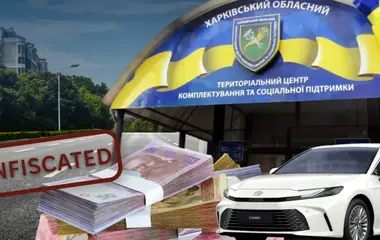The draft Rule of Law Reform Roadmap, developed as a result of cooperation between Ukrainian anti-corruption agencies, the Ministry of Justice, the High Anti-Corruption Court and other institutions, as well as consultations with the European Commission (EC), sets out two main vectors for Ukraine's anti-corruption efforts. These are ensuring high efficiency of the overall system of preventing and combating corruption, as well as minimizing corruption in the most affected and strategically important areas for the state. First of all, it is about implementing high-quality sectoral reforms that comply with EU legislation and best international practices.
This was stated by Viktor Pavlushchyk, Head of the National Agency on Corruption Prevention (NACP), on February 7 at the forum “Ukraine's Accession to the EU: Shaping the Transformation Agenda” dedicated to the strategic directions of transformation defined in the roadmaps for EU accession.
The Head of NACP noted that the bilateral meeting with the EC, the Report on Ukraine's Progress under the 2024 Enlargement Package and the 2025 Screening Report confirm that the EC is less and less interested in providing palliative solutions aimed at responding to individual challenges and critical problems. Ukraine is expected to move to a systematic, progressive, and at the same time proactive anti-corruption policy.
Previously, Ukraine was focused on the creation and development of anti-corruption bodies and the tools for their work. The current task is to ensure their high efficiency, sustainability of work, and development of systemic corruption prevention, modern approaches to which should be based on data and create mechanisms of state functioning that prevent or minimize corruption risks. In view of this, the key challenge for Ukraine and NACP in the coming years is to develop and approve a new Anti-Corruption Strategy and the State Anti-Corruption Program (“SACP”) for 2026-2030, and to implement them in a quality manner.
"Thanks to this, Ukraine will be able to make a big qualitative leap. Anti-corruption reforms are one of the key priorities on the way to the EU, without them the negotiating chapters will not be closed, and we see that our international partners are ready to support systemic changes,” said the NACP Head.

He also explained how NACP coordinates anti-corruption mainstreaming - the presence of anti-corruption safeguards - in all negotiating chapters. The anti-corruption mainstreaming is synchronized with the Anti-Corruption Strategy and state anti-corruption program: these processes are closely related but do not duplicate each other. The differences are that the structure of mainstreaming is dictated by the structure of the negotiation process and its respective sections. Instead, the structure of the Strategy combines two main areas: further improvement of the general system of preventing and combating corruption and prevention of corruption in the priority areas of state functioning. The Strategy does not cover all policy areas, but focuses on the most important and vulnerable to corruption. This approach is in line with the best European practices: by putting maximum effort into the selected areas, we get maximum results.
The second key difference is that the mainstreaming is based primarily on the expectations of the European Commission regarding anti-corruption measures related to a particular negotiated chapter. The new Anti-Corruption Strategy, in its second, “sectoral” part, will focus on the key issues that have the greatest negative impact on the functioning of a particular sector now and for the next five years.
NACP plays a key role in both processes - in anti-corruption mainstreaming and in the development of the anti-corruption strategy. However, during mainstreaming, the role of the coordinator in the negotiations is played by the relevant ministry or other body that collects and summarizes information on the relevant area. It is also responsible for preparing for bilateral meetings on the negotiation section. In this process, NACP provides advisory and methodological support to the relevant body. At the same time, according to the Law on Prevention of Corruption, the NACP is fully responsible for drafting the Anti-Corruption Strategy and the State Anti-Corruption Program, as well as for further coordination, monitoring and evaluation of their implementation. Therefore, NACP will definitely use the developments of the relevant ministries in terms of AC mainstreaming to prepare the AC Strategy and the SACP.
At the same time, as the European Commission emphasizes, not only a high-quality legislative framework is important for the implementation of anti-corruption reforms, but also the capacity of the institutions that implement these reforms. In particular, NACP should strengthen its institutional capacity to effectively monitor the implementation of anti-corruption measures, in particular in terms of sectoral anti-corruption policy. Having a high capacity to use such tools as the SAP, work with authorized units for prevention and detection of corruption, as well as anti-corruption programs of public institutions; anti-corruption expertise of draft legal acts and strategic analysis of corruption risks, the NACP is aware of its need for a deep understanding of the areas of public policy where corruption has the most destructive impact. The National Agency has made appropriate changes to its structure to focus on priority areas.
Olha Stefanishyna, Vice Prime Minister for European and Euro-Atlantic Integration of Ukraine and Minister of Justice, noted that the Fundamental Spheres cluster is the first to open and the last to close. It is the main cluster in the negotiation process, structuring and uniting the state around the key areas in which the country will move, including the functioning of institutions, transparent and effective governance, and anti-corruption policy. The second cluster is the domestic market.
"The fight against corruption is a red thread running through all the clusters, and none of them will be closed without appropriate decisions. The first cluster is the soul of our future EU membership, and the internal market is the body. One without the other: the soul can fly to the European future, but the body cannot reach it. We are expecting a request from the European side for roadmaps, which we are ready to provide and start working on the clusters in April. The Polish presidency of the Council of the European Union also proposed to open negotiations on foreign security and policy, which is also very important, and these negotiations have already started very well,” she added.
As a reminder, the roadmap for this negotiating section “Rule of Law”, as well as roadmaps for public administration and democratic institutions, are necessary for the start of negotiations on Ukraine's accession to the EU under the first negotiating cluster.
For more information
The forum “Ukraine's Accession to the EU: Shaping a Transformational Agenda” brought together a wide range of representatives of government agencies, the European Union, and the expert community. Roadmaps in the areas of the rule of law, public administration, and the functioning of democratic institutions are a key benchmark for the coming years for Ukraine to achieve the EU membership criteria.
The issues underlying the roadmaps were the focus of bilateral meetings between Ukraine and the EU as part of the screening of Ukrainian legislation, and they also take into account the recommendations set out in the EU's Enlargement Package for Ukraine and previously adopted strategic documents.
The Rule of Law Roadmap identifies key steps in the areas of the judiciary, anti-corruption, human rights, and security. In particular, it outlines four key areas of state transformation: the judiciary; fighting corruption; fundamental rights; justice, freedom and security.
The roadmap includes, among other things, optimization of the court network and creation of an administrative court to hear disputes with the central government, as well as improvement of the system of selection of judges and prosecutors. One of the important elements is the digitalization of the entire judicial system. One of the strategic documents of the roadmap is the Anti-Corruption Strategy and State Program for 2026-2030. It defines a list of measures aimed at strengthening liability for corruption crimes.
The forum was attended by EU Commissioner for Enlargement Marta Kos (online), Gert Jan Koopman, Acting Director-General of the European Commission's Directorate-General for Neighborhood Policy and Enlargement Negotiations (DG NEAR), Head of the Verkhovna Rada of Ukraine Ruslan Stefanchuk, Oleksandr Kornienko, First Vice-Speaker of the Parliament of Ukraine, Denys Maslov, Head of the Verkhovna Rada Committee on Legal Policy, Anastasia Radina, Head of the Verkhovna Rada Committee on Anti-Corruption Policy, Olha Herasymiuk, Head of the National Council of Ukraine on Television and Radio Broadcasting and others.
The event was organized by the Office of the Vice Prime Minister for European and Euro-Atlantic Integration and the Ministry of Justice of Ukraine in partnership with the project “Support to Ukraine's Rule of Law Enhancement” (3*E4U), implemented on behalf of the Federal Foreign Office of Germany by Deutsche Gesellschaft für International Zusammenarbeit (GIZ) GmbH, and the EU Project “Pravo-Justice” implemented by Expertise France.










